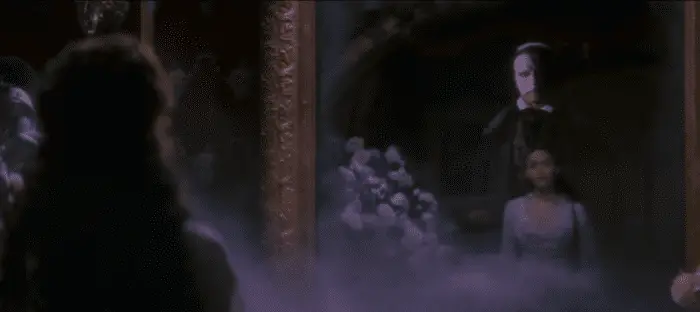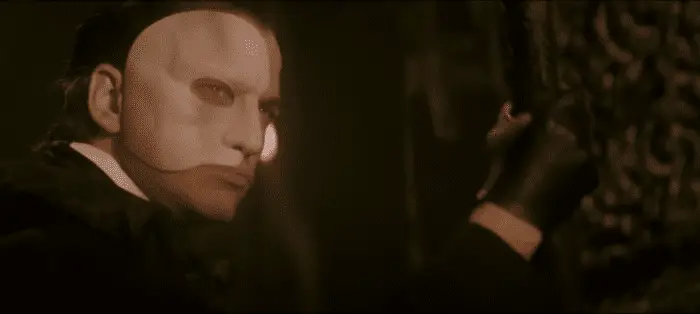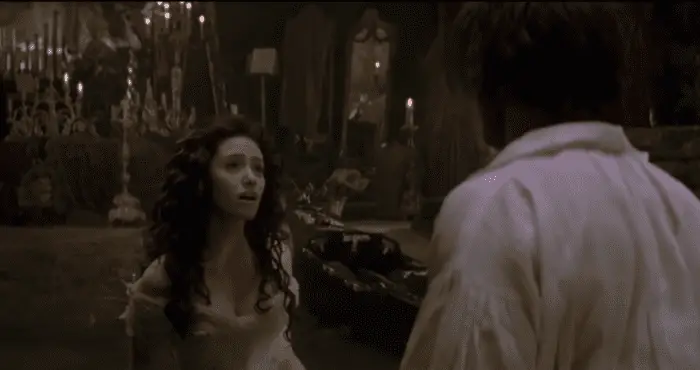Based on the worldwide hit stage play of the same title, 2004’s The Phantom of the Opera is a love story for the ages featuring a handsome Count, a fair maiden, and an evil presence. However, it also is much more than that, a multilayered tale of twisted love, hatred, and how solitude can warp and twist one’s perception of reality. It is also the story of how trauma guided and impacted the lives of its two main protagonists, namely The Phantom and Christine, as they deal with the events of their respective pasts and navigate the present to feel the emotions within themselves correctly.
Foundation of Trauma: The Mirror

To understand the characters of The Phantom and Christine, one must understand the foundational events that changed the course of their lives forever. For The Phantom, this event was the killing of his abuser, and for Christine, it was the death of her father. Both of these events cemented the emotions and stunted the growth of the above-mentioned characters.
Christine loved her father very much, and when he died, she was not only devastated but also cast out and abandoned at the Paris Opera House. She was raised without care and love, only receiving discipline from her overseers. Playing small roles and regulated to obscurity, she found validation and love in the metaphorical arms of The Phantom who allowed Christine, for the first time since her father died, to feel validation, love, and care.
The Phantom on the other hand was almost the opposite: born rejected and treated without care and love for all of his young life, the only thing he experienced was abusive discipline. When Christine first arrived at the Opera House and The Phantom began teaching her, he experienced for the first time validation, love, and care, as Christine viewed him as an “Angel of Music” sent from her father, or the spirit of her Father himself. This was likely the first time The Phantom even felt these emotions and he found himself growing ever more attached to Christine as time went on.
Christine and The Phantom are in many ways mirrors of each other, as we see when he first reveals himself to her, she gazes into her mirror and slowly her image is replaced by The Phantom’s form. They both are broken people, connected by trauma, who are using each other to fill a void in their souls.
Dark Fantasies: Music of the Night

The lyrics from one of the most famous songs of the film, “Music of the Night,” go like this….
Softly, deftly music shall caress you
Hear it, feel it secretly possess you
Open up your mind, let your fantasies unwind
In this darkness which you know you can not fight
The darkness of the music of the night
Let your mind start a journey through a strange new world
Leave all thoughts of the life you knew before
Let your soul take you where you long to be
Only then can you belong to me
The idea of fantasy runs throughout the film and its two characters, showing how they each deal with the life they have and the history they carry. The Phantom is showcased as an emotionally stunted individual who is trying to cope with his newfound feelings of love, in the only way he knows how, through using fantasy as a means to understand the world. When he begins to feel love and attraction to Christine, he has nothing in real life to frame these feelings with. He has never seen love or care in the real world, and because he is disfigured, he has been forced to live a life of solitude in the bowels of the Opera house. Books, plays, and music are his only friend and guide to the world. He has likely read stories such as Beauty and the Beast and The Hunchback of Notre Dame that describe a romance of a beautiful woman to a man who is unloved and unwanted by the world.
Trapped in the Opera House, he has also embraced music and the tales of sweeping romance told in the nightly Opras, This is his guide to how he should love and how he should feel emotion. He bursts forth in fits of love and rage, much like the characters in his beloved “Music of the Night”: the song itself tells this story, as the lyrics describe his musical life and his inviting Christine to join him on his journey.
Let your mind start a journey through a strange new world
Leave all thoughts of the life you knew before
Let your soul take you where you long to be
All of which shows her what he went through: the dark fantasies of the music and opera allowed him to journey into the strange world of emotion and love, where he hopes it will take his soul to a place of care and love that he has never known before.
In much the same way, many wonder why would Christine join and go with him. However. Christine is much like the Phantom: she has been stunted emotionally from the death of her father, she has grown into a young woman inside the Opera house, and has seemingly not experienced much of the outside world. Besides her childhood crush on the Count, she has never experienced love or care. She has also lived and loved the opera and its lavish, larger-than-life characters. She desperately wants to believe in the Angel of Music, from her father, and why can’t she? The Opera is filled with stories such as this, she even tricks herself into seeing what is not there. As the Phantom leads her to his lair, she sees brightly lit hallways with gold and candles, but when the Count follows, we see in reality it’s a dark, wet, and cobwebs-filled hallway. Again when she goes to talk to her father at his grave, she imagines light from his tomb greeting her, and the voice of the Phantom she hopes is maybe her Father called out to her, but again when we are shown the reality, the tomb is dark and cold and it was all in her mind, created by the fantasy of the music of the night.
True Loves Kiss: The Point of No Return

It is not until the third act and the climax of the picture that the Phantom and Christine are broken out of the dark fantasies they have allowed themselves to be ensnared by. As the story leads up to their final encounter, we see Christine caught up in the narrative of the handsome Count saving his love from the monster. The Phantom, meanwhile, has descended into an Opera-like story of revenge and possession, determined to take Christine and kill his rival the Count.
Once The Count is tied up and the Phantom threatens to kill him if Christine won’t come away with him, she finally breaks free of the fantasy. The Count is unable to save her, and she is unable to save herself; the only thing she can do is, as the song says, “Open up your mind, let your fantasies unwind.” It’s then she sees the Phantom for who he truly is, a broken man. She kisses him to save who she truly loves in a selfless act, and frees all three of them.
When he is kissed, the Phantom is also pulled out of his delusions and sees the story for the real-life event that it is. He tells the Count that he would never hurt Christine, but the kiss makes him realize that he is killing her by making her stay with someone she does not love. So he selflessly lets her go. In the last song, he is seen smashing mirrors and lamenting that the music of the night is over. He has finally opened up his mind and allowed his fantasies to unwind; he sees life as more than the music of the night and departs for a new life.
2004’s The Phantom of the Opera is a fascinating picture, one that frames Christine and The Phantom as two sides of the same coin. Both were triggered by trauma, both molded and guided by the fantasy world of the opera, who in the end needed each other to break free from that world and find new meaning and purpose in their lives. The motion picture is not so much a monster story as a tale of how love and loss can impact the human psyche and allow it to either be bound or free.


